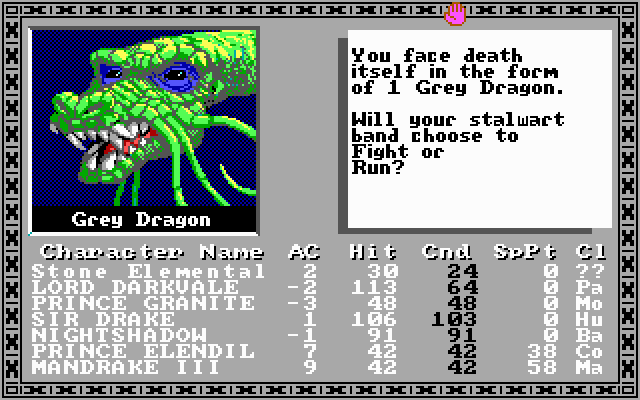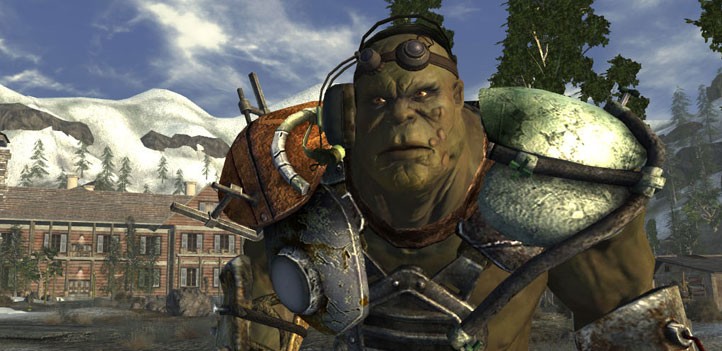Brian Fargo, Josh Sawyer, and Gordon Walton on the history and future of RPGs

Going back to something Gordon said, I think there are a lot of people who’ve been playing games for a long time, and grow up, they’re totally happy to play games four hours long and ten hours long at the high end. They’ll pay 20, 30, 50 bucks for that, and they get their emotional payoff from it and they’re cool. Are you guys interested in making an RPG that maybe has the gameplay sophistication of a Wasteland or a Pillars but is a much shorter game in general? Those are big-ass games that you’ve delivered.
BF: I don’t know if our audience would accept that.
JS: What I would say is I think you’re right, and I think the biggest issue there is audience expectation. I think it’s worth bringing up, and actually our lead narrative designer on Pillars of Eternity, Eric Fenstermaker, just did an interview with RPG Codex where he said, ‘Hey, I would personally like to make shorter games that have even richer reactivity and where you’re much more likely, even as an average gamer, to play through it multiple times.'
But with Pillars, you’re probably playing it 25 hours minimum if you’re really cruising through it, and a lot of people say they clock over 100 hours on one playthrough because they’re doing it exhaustively. I do think there’s a player expectation thing, especially in the case of Wasteland or in the case of the Infinity Engine games, those games were long, so if you make a spiritual successor and it’s like half the length, people are like, ‘Whoa, whoa, whoa, you screwed up, man. You sold us short.’ So I think the biggest issue there, Brian was right, is the audience expectation.
BF: Somebody else could probably do it. They can do it.
JS: I think another way we could do it is we could make a game that, if it doesn’t quite have the same expectations—we’re not saying it’s an Infinity Engine successor or it’s not a ‘this’ successor—maybe it’s a fantasy RPG but we’re saying, ‘Hey, our goal here specifically is to have the richest reactivity you possibly can but it’s a 30-hour game or a 40-hour game. But—
BF: 40? He’s saying, like, five.
Keep up to date with the most important stories and the best deals, as picked by the PC Gamer team.
Only 40?
JS: Well, let’s start with something that people might be able to accept.
BF: I think they would accept 30. But he’s saying, like, under ten.
JS: I think we could get there, and I think that would be cool. And I think that there are people that are making games like that now, maybe not role-playing games in the style that we’re making them, but if you go back, there’s a console game... What platform was it on? Way of the Samurai. You know what I’m talking about?
BF: That was 3DO, wasn’t it?
JS: Oh, jeez, I don’t remember, but Way of the Samurai was actually pretty darn cool because it was a two or three-hour game...
BF: It was a role-playing game?
JS: No, it was a console-
Are you talking about Samurai Spirit, the fighting game? [Ed note: clearly I meant Samurai Shodown!]
JS: It was a console, kind of, action-y game.
I want to say PS2 maybe?
JS: Yeah, I think so. But the idea is that there’s X number of days before the army arrives and destroys this whole village, and so you have that many days to go around and do whatever you’re gonna do, and then at the end it’s like, ‘This happens, this happens, this happens, this happens, this happens. This is ending number 39.’ You’re like, ‘What the hell?’, and then you play through it again and you do the whole thing again.
Another game I can think of that really focused just on narrative stuff that’s really cool is The Yawhg. Emily Carroll is this great illustrator, great writer. She’s done a lot of cool comics and books and things like that, and she worked with some folks on making this game called The Yawhg. I very strongly recommend it. It’s actually great as a party game for four people. And it’s got this really really light RPG mechanic that’s for checks in these little interactions, but there’s lots of reactivity. You can play through the whole thing in half an hour or 45 minutes, and it has a lot of reactivity, and then you can go right back in and play it again. So there are games that are pushing these boundaries, that have really cool reactivity. I would like to work on a shorter game like that.
But again, Brian said it right away. Our audience has certain expectations.
What’s some stuff that you’ve seen in games recently that makes you jealous?
BF: That’s a good question. Well, how much money Supercell is making. [Laughter.] Sometimes I’m jealous of where they have these huge VO budgets. I can’t do VO for every single line in my game, and some of the products I see where they do that, I love that because reading is great, and I don’t mind it, but boy, when a line is delivered it brings a different emotional context to it. So whenever I see big audio budgets for recording I’m a little jealous of that.
JS: It’s weird for me right now because, the last really big game I worked on and shipped was Fallout: New Vegas, so that was last console generation. Working on Pillars, I don’t get a lot of jealousy because it’s like we’re so technologically far back from that stuff. But yeah, I would say the VO, because that was actually a pretty big criticism in Pillars, that we didn’t have consistent VO for all the characters, all the characters that had VO didn’t have VO in all the conversations. And coming from New Vegas especially where every single line of dialogue is focused, which in itself is kind of a nightmare, but it’s nice though, because like you said, it’s fun to read, but when you get the VO on top of it, it adds a lot of dimension to it. It immerses you in what’s going on. But some of the open-world tech I look at, I get kind of jealous about, but I don’t know, we’ll see if I ever work on a big open-world game again.

Are there any non-RPGs recently you’ve played that you think have interesting ideas that could be incorporated in the kind of games you guys make?
BF: I find making RPGs is like being a decathlete. We have to be really good at ten events but it’s hard to be world class at any particular one because you don’t get to hyper-focus on one thing. So I’ll see some strategy game that’s super narrow and tight, it can be Darkest Dungeon or This War of Mine, where they’re creating some mood or doing some kind of survivability sort of thing that I really really like, and so I will see things in individual games like that that I really like and learn from, basically. But we do have the challenge that we have to manage all these different things. We can’t just be one single thing. We have to make the variables work across combat, across conversation, across 100 hours. It’s a very different kind of experience to build. For me, it’s absolutely the most difficult.
JS: I would say a thing that I find interesting is, I really like the trend toward experience-based—I’m not even gonna say ‘games’—virtual experiences. And so I do mean games like Gone Home or Cibele or Tacoma or, I just played Firewatch. Those are really interesting because, again, they’re super narrowly focused, and because their focus is really on evoking an experience they can really, really hone in and try to focus on just accomplishing a very small subset of things. It’s so radically different from making a role-playing game, because we’re so crunchy and so all over the place, and I like that. It’s weird, because I see a lot of grogs out there that really hate those sort of virtual experience type games, and they’re like, ‘Don’t you hate them?’ I’m like, ‘No, I think they’re cool. They're just another type of game, and I think it is cool that people already make them.’
Actually, another one that I played where it was such a good marriage of concept and mechanics is Papers, Please! So good. You have this mechanical process but it’s tying it into the choices that you make in a very clean way. It was such a good marriage of the high concept and the low-level mechanics, working together in a way where it’s like, ‘Yeah, dude, you’re just letting people through a checkpoint but you’re also kind of dehumanizing people, or you’re maybe saving them, or you’re accepting bribes,’ because you have to go home, take care of your sick wife and all this other stuff. You can get caught by the government.
Games like that, where they’re really focusing on accomplishing a very small subset of things, I think those are really really cool, and it’s something that, making RPGs, it’s very hard to do that. AAA games can’t really afford to do that because they need to be very mass appeal, but I love seeing those games in practice.
Or Nidhogg. That game is insane. That little dueling game. It’s so simple but it’s so focused and crazy, and you hear people—the best Nidhogg videos are ones where you hear the people playing it and their voices and they’re going insane. That’s such a great thing. So I love all of these super-focused games.
BF: They’re doing stuff with VR now where it’s going to track if people get frustrated. So you’ll get more benefit of, like, if they get pissed off and raise their hands it’ll recognize that and really sell it to you, so you can really dance on their grave. I think that’s just so funny.

Wes has been covering games and hardware for more than 10 years, first at tech sites like The Wirecutter and Tested before joining the PC Gamer team in 2014. Wes plays a little bit of everything, but he'll always jump at the chance to cover emulation and Japanese games.
When he's not obsessively optimizing and re-optimizing a tangle of conveyor belts in Satisfactory (it's really becoming a problem), he's probably playing a 20-year-old Final Fantasy or some opaque ASCII roguelike. With a focus on writing and editing features, he seeks out personal stories and in-depth histories from the corners of PC gaming and its niche communities. 50% pizza by volume (deep dish, to be specific).

